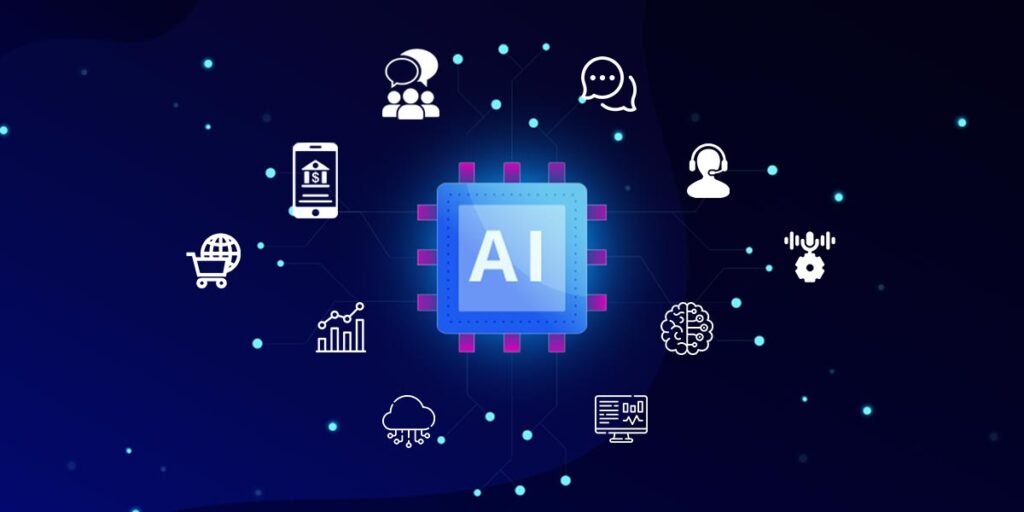Micro, small, and medium enterprises (MSMEs) create enormous value worldwide—they account for roughly half of global GDP in aggregate and represent about 90% of businesses in many economies, although exact shares vary by country and sector.
This implies that while superscale behemoths like Amazon and Google may get media attention for their AI tools for entrepreneur development and sales, the true value in these tools will likely be created by the worldwide network of inventors, entrepreneurs, and dreamers operating tiny firms.
AI can assist with a lot of the labor-intensive tasks associated with marketing, administration, compliance, customer support, and other areas if that describes you. Here is a summary of some of the top AI tools for entrepreneurs we have found. Any company owner, independent contractor, or self-employed tradesperson may easily join the AI revolution with the help of these tools.
The Best AI Tools For Entrepreneurs

1. ChatGPT
Among the most visible generative AI chatbots, ChatGPT has helped bring LLMs into mainstream awareness. ChatGPT popularized modern large-language-model chatbots and played a substantial role in bringing generative AI to mainstream attention. OpenAI offers multiple model versions (e.g., GPT-4o) via ChatGPT and related APIs.
Model availability depends on the plan (Plus, Pro, or Enterprise) and is updated frequently. Learn how to utilize ChatGPT, comprehend its operation, and find out how to compose sales emails, market research, and marketing content.
Additionally, you can integrate ChatGPT with thousands of other applications via Zapier’s integration, which lets you create workflows that integrate AI into every aspect of your business. For instance, you may use survey tools to automatically gather participant feedback after an event, have ChatGPT distill the comments into important topics, and create customized follow-up emails depending on participant participation.
Features:
- Content generation.
- Contextual guidance.
- Natural language processing.
- Chatbot.
- Data extraction.
- Live chat.
- Intent recognition.
- Rich text editor.
- Data import/export.
- Language detection and many more.
Price:
- Free plan available.
- Plus: $20/user/month.
- Pro: $200/month.
- Team/Enterprise tiers are available ($30/user/month)—region may vary.
2. Claude
Anthropic’s Claude supports “Artifacts”—outputs that can be turned into shareable, interactive apps and tools; the feature is available broadly to Claude users. It can create games for you, compose papers in a different tab, and code basic interactive interfaces. Use the instructions on the left side of the screen to make adjustments, then watch as they take form on the right.
You may create complex processes that utilize Zapier’s reasoning skills across your tech stack by integrating it with Claude. AI may be used, for instance, to evaluate research reports or contracts, add contextual information to the results, and then share the results via email, Slack, or your internal knowledge base without the need for human participation. Learn more about automating Claude.
Features:
- Natural language processing.
- Content generation.
- Interactive and co-creative systems.
- Data augmentation.
- API.
- Personalization and recommendation.
Price:
- Free plan available.
- Contact sales for pricing.
3. Zapier Agents
You can train AI agents to function across thousands of applications with this one of the top AI tools for entrepreneurs, an experimental AI workspace. However, because the interface is a chatbot, utilizing ChatGPT to create your own AI agent is as easy as pie.
Start by granting your agent access to the source of truth for your business, which can be found in tools such as Airtable, Notion, and HubSpot. It will automatically sync data sources, and you may ask it about your data as well as all the data in your applications.
It is also possible to educate your agents to function even when you are not there by instructing them on how to analyze or summarize data, what to do when triggered, and what actions to take—all without writing a single line of code.
These agents assist you with certain duties, such as reviewing your spreadsheets, doing online searches, or creating client answers. They are similar to mini-teammates. It combines data analysis, automation, and AI chat in one location. Get started for free after learning more about Zapier Agents.
Features:
- Behavior-Driven Automation (Custom Behaviors).
- Large App Ecosystem Integration.
- Live Data/Knowledge Source Access.
- Agent-to-Agent Collaboration/Orchestration.
- Templates and Prompt Assistance for Building Agents.
- Pods/Agent Grouping and Activity Monitoring and many more.
Price:
- Free plan available.
- Pro plan costs $50 per month and includes a fixed number of agent activities, such as 1,500 activities.
4. ClickUp
An AI-powered assistant that is smoothly incorporated into the ClickUp productivity platform is called ClickUp AI. It is prepared to help you with a variety of activities, including: Whether creating blog articles, creating marketing material, or distilling lengthy papers, ClickUp AI is a master at creating text for a variety of uses. ClickUp AI supports multilingual translation among its features.
ClickUp AI is adept at answering your questions on a variety of subjects, including productivity, project management, and the complexities of business. For projects, product development, or strategic marketing efforts, ClickUp AI is a useful tool for generating creative ideas.
Long texts are streamlined by ClickUp AI into forms that are clear and simple to read. Even though ClickUp AI is still developing, it already shows promise as a powerful tool that can boost output and efficiency.
Features:
- Bug tracking.
- Campaign management.
- Dashboard.
- Dependency tracking.
- Display ad management.
- Due date tracking.
- Employee activity monitoring.
- Idea ranking.
- Knowledge management.
- Markup Tools and many more.
Price:
- Free plan available.
- Unlimited: $10/user/month.
- Business: $19/user/month.
5. DALL-E
DALL-E (for example, the DALL-E 3 model by OpenAI) is a diffusion model and one of the best AI tools for entrepreneurs. Its capacity to produce realistic visuals from written descriptions is one of its most impressive features. If you give DALL-E 3 a prompt such as “a cat riding a unicycle on a rainbow,” for example, it may generate a picture that matches that description.
Despite still being in the early phases of development, DALL-E 3 has already shown its promise in a number of applications. DALL-E 3 may be used to create creative artwork, including sculptures, paintings, and sketches.
The design process benefits greatly from DALL-E 3, which supports ideation and prototype visuals for goods such as toys, furniture, and apparel. DALL-E 3 contributes its skills to the creation of advertising, flyers, and posters, among other marketing materials.
By creating illustrative materials, such as diagrams and images, DALL-E 3 may support instructional initiatives. DALL-E 3 has enormous potential for a wide range of imaginative and useful applications, despite its continuous growth.
Features:
- Natural language processing.
- API.
- Creative design.
- Content generation.
- Text to image.
- AI/Machine learning.
- Generative fill.
- Media upload.
- Prompt engineering.
- Machine learning and many more.
Price: Dependent on API usage and image outputs.
6. Jasper
Jasper is a potent AI platform for creating content that caters to people that need a lot of stuff. It comes with hundreds of templates to get you started, connects to the internet to locate sources and study, and uses artificial intelligence to create visuals. This is the place to go for all of your content production requirements.
Zapier allows you to link Jasper to hundreds of other applications. In this manner, you may include AI in multi-step processes involving teams and technologies. You may, for instance, use campaign briefs to automatically generate customized ad text, submit drafts for approval via Slack or other project management applications, and upload the finished products into your CMS or DAM system.
Features:
- AI/Machine learning.
- Rich text editor.
- Marketing management.
- For marketing and advertising.
- Content delivery.
- Text editing.
- Long-form content.
- Content library.
- Auto-Save.
- Machine learning and many more.
Price:
- Starter: $29/month.
- Pro: $109/month.
- Boss Mode: $119/month.
Read More: 9 Benefits of AI Agents Every Business Must Know
7. Vista Social
It’s simple to get distracted while overseeing more channels at once. Everything related to social media is gathered in one location by Vista Social. For example, you may start writing for LinkedIn but have it ready for Facebook and Instagram thanks to the AI technologies that assist in adapting material from one platform to another.
You can coordinate increasingly complex AI-powered processes across your technology stack by integrating Vista Social with Zapier. AI may, for instance, plan post variants in Vista Social, create them based on performance data, and record interaction metrics in your business intelligence tool.
Features:
- API
- Social advertising.
- Role-based permissions.
- Calendar management.
- Dashboard.
- Performance metrics.
- Engagement tracking.
- Activity dashboard.
- Customizable reports.
- Social media monitoring and many more.
Price:
- Professional: $79/month.
- Advanced: $149/month.
- Enterprise: $349/month.
8. Notion AI
Although Notion is one of the top AI tools for entrepreneurs for information organization, even with strict discipline, crucial pages will still get lost. This is no longer the case with Notion AI Q&A, which uses your data to produce responses and direct you to the relevant sources, bringing back that forgotten insight you captured during a conversation years ago.
You may integrate Notion into more comprehensive, AI-planned workflows that maintain Notion’s alignment with the rest of your company operations by connecting it to Zapier. For instance, you can use Notion AI to create a project brief for each new task uploaded in Asana and notify your team via Slack when it’s ready for review.
Features:
- KPI monitoring.
- Customizable dashboard.
- Configurable workflow.
- Requirements management.
- Project management.
- Project workflow.
- Notes management.
- Real-time editing.
- Knowledge management.
- Idea management and many more.
Price:
- Free plan available.
- Plus: $12/user/month.
- Business: $18/user/month.
9. Asana
Asana, a project management powerhouse, offers a plethora of practical AI-powered capabilities. To create better objectives for the quarter, SMART goals take advantage of prior data. It helps you address issues before they arise by identifying workflow obstacles and project risks. Additionally, it answers all of your project-related questions, giving you a better understanding of what is—or isn’t—occurring.
You can create complex, multi-step workflows that automate whole project management processes by integrating Asana with Zapier. For instance, you may use AI to summarize or classify the content of a tagged message in Slack, automatically build a new Airtable record with the contents, and then update Asana with the appropriate task. Find out more about automating Asana.
Features:
- For IT project management.
- Multi-channel marketing.
- Spreadsheet view.
- Single-page view.
- Process modeling and designing.
- Product lifecycle management.
- ROI tracking.
- Product roadmapping.
- Resource scheduling.
- Campaign scheduling and many more.
Price:
- Free plan available.
- Starter: $10.99/user/month.
- Advanced: $24.99/user/month.
The Future Of AI In Business
The AI tools for entrepreneurs are altering the way firms operate, develop, and connect with consumers. As technology improves, AI will become an ever more vital driver of efficiency, innovation, and competitiveness in the corporate sector.
One of the most crucial future developments is the broad deployment of generative AI. Tools capable of creating text, graphics, code, and insights will expedite marketing, product creation, and customer service, allowing organizations to create tailored experiences at scale. Combined with natural language processing, AI will help teams evaluate unstructured data, find market trends, and produce hyper-relevant content in real time.
Automation is expected to move beyond mundane jobs and incorporate more strategic decision-making. Intelligent systems will aid in anticipating demand, improving supply chains, and boosting risk management. In manufacturing, AI-powered robots and predictive maintenance will cut downtime and boost efficiency. Finance and healthcare will employ modern algorithms for fraud detection, compliance, diagnostics, and patient care.
Ethical and ethical AI development will be key to its future in business. Organizations will require clear governance, transparency, and bias-mitigation plans to preserve consumer confidence and comply with shifting legislation. Sustainability will also drive AI innovation, with energy-efficient models and green data centers enabling eco-friendly development.
Moreover, the partnership between humans and AI will redefine jobs. Rather than replacing experts, AI will improve existing talents, enabling them to concentrate on creativity, relationship-building, and strategic thinking. Upskilling staff in data literacy and AI technologies will be vital to leverage this synergy.
As AI becomes more accessible and sophisticated, firms that embrace its promise responsibly will gain a decisive advantage. The future belongs to firms that mix innovation with ethics, employing AI to produce better operations, deeper insights, and enduring consumer value.
FAQ
Q: What role does AI play in entrepreneurship?
A: These days, entrepreneurs may automate market research, customer service, transaction processing, and website construction. These agents greatly expand capacity, although human supervision is still necessary. To put it simply, AI makes business owners smarter rather than just larger.
Q: What is the AI 30% rule?
A: According to the 30% rule, people should be in charge of the remaining 30% of a job or process, with AI and automation handling the remaining 70%. This rule aims to achieve a balance between the usage of AI and human involvement.
Q: Can marketing techniques benefit from AI?
A: By automating repetitive processes like the preparation of client data, artificial intelligence (AI) technology assists marketing teams in enhancing their customer relationship management (CRM) programs. Additionally, they can detect at-risk clients, provide more individualized customer messaging, and lessen the possibility of human mistakes.







